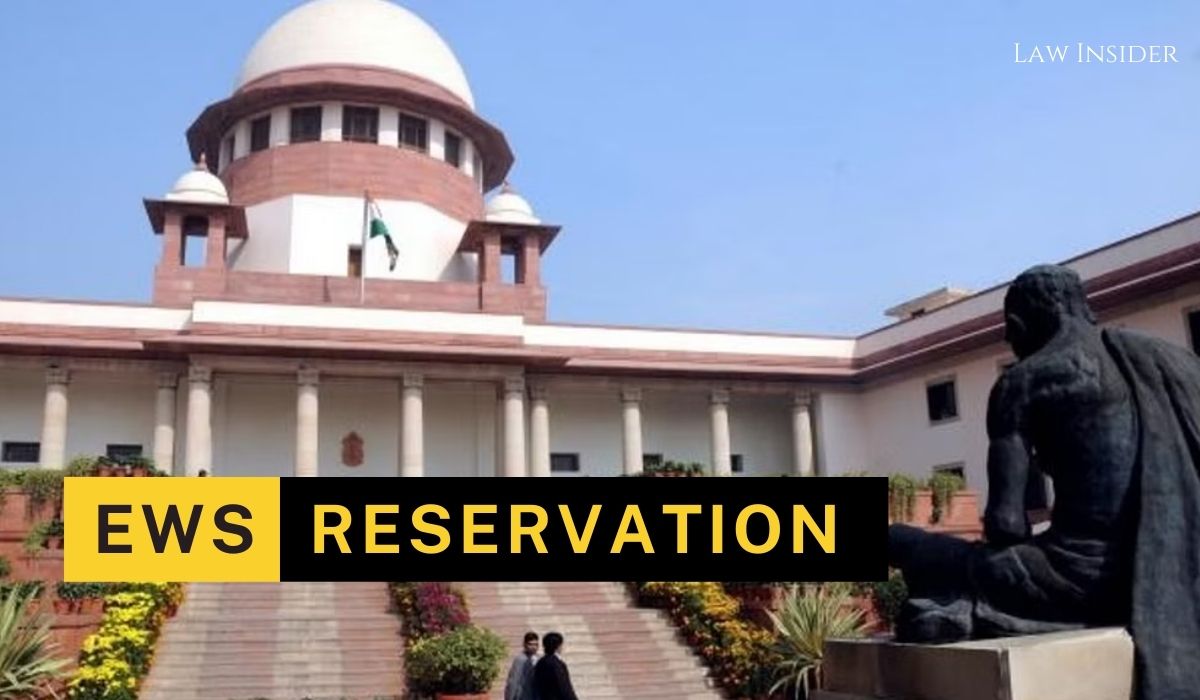Sakina Tashrifwala
Published on: November 7, 2022 at 19:51 IST
The 103rd Constitutional Amendment, which included a 10% reservation for Economically Weaker Sections (EWS) in education and public employment, has been affirmed as lawful by a 3:2 majority of the Supreme Court Constitution Bench.
Justice S Ravindra Bhat wrote a dissenting verdict to overturn the 103rd Constitution Amendment, which was backed by Justices Dinesh Maheshwari, Bela Trivedi, and JB Pardiwala.
Uday Umesh Lalit, the Chief Justice of India, agreed with Justice Bhat’s point of view in the minority.
According to Justice Dinesh Maheshwari, the case revolved around three fundamental issues:
1. Whether the 103rd Constitutional Amendment violates the fundamental principles of government by granting reservations purely based on economic factors.
2. Whether the amendment’s exclusion of the poor from the SC/ST/OBC categories from the EWS Quota violates the fundamental principles of the Constitution.
3. Whether the amendment violates the fundamental design by going over the 50% ceiling unit.
The majority opinion is that none of the aforementioned issues are violated by the revision with regard to the fundamental structure.
According to the majority opinion of Justices Dinesh Maheshwari, Bela M. Trivedi, and J.B. Pardiwala, a reservation programme based only on economic factors does not infringe on the Constitution’s fundamental principles.
Additionally, they have argued that the EWS reservation’s violation of the 50% ceiling limit does not undermine the basic framework.
“Reservations are a tool used by the state to ensure an inclusive approach through affirmative action. It serves as a tool for classes that are socially and educationally disadvantaged as well.
Due to the 50% maximum restriction, reservations for EWS do not contradict the fundamental structure because the ceiling limit is flexible,” according to Justice Maheshwari’s majority opinion.
In her ruling, Justice Trivedi stated that the State had released an amendment for the advancement of EWS categories. She noticed,
“The contested amendment must be viewed as a positive step taken by the Parliament on behalf of the EWS class. It cannot be argued that the categorisation is unfair. It might be appropriate to classify EWS as a different class.
In the same way that unequals cannot be treated unequally, neither can equals. Equal treatment of people who are not equal is prohibited by the Constitution. A different class of EWS is created under the change. One cannot claim that the exclusion of SEBCs constitutes discrimination or a constitutional violation.”
The verdict included comments from Justices Trivedi and Pardiwala regarding the necessity of a reserve period.
Dissident Opinion
However, the Chief Justice of India UU Lalit and Justice S Ravindra Bhat stated in their dissenting opinion that economic criteria-based discrimination is not necessarily illegal.
However, the 103rd Amendment engages in types of discrimination that are expressly forbid by the constitution when it excludes SC/ST/OBC impoverished people from economically backward classes (on the grounds that they have received assistance). They stated:
“Exclusion is prohibited under our constitution, and this change weakens the foundational principles of social fairness. This modification is leading us to believe that individuals receiving social benefits and benefits from the lower classes are somehow in a better position.
According to this court, 16(1) and (4) are two sides of the same equality principle. It’s untrue to say that SEBCs exclude the underprivileged. Benefits are not to be interpreted as a free pass; rather, they are a means of restitution and compensation. The equality code is destroyed because the exclusion is based on social origin.”
They also advocated against going above the 50% cap when it comes to reservations. He stated:
“Allowing a 50% breach would lead to compartmentalization. The principle of equal rights will change to the principle of reservations, returning us to Champakam Dorairajan.”
Background
The petitions contested the constitutionality of the 2019 Constitution (103rd Amendment Act).
Articles 15 and 16 of the Constitution were amended by the Parliament in January 2019 to include clause (6), which would provide for economic reservation in employment and education.
The recently added Article 15(6) gave the State the ability to implement special measures, such as reservations in educational institutions, for the advancement of any economically underprivileged group of individuals.
Any educational institution, including private institutions, whether aided or unaided, is allowed to make this reservation, with the exception of minority educational institutions protected by Article 30 (1).
It further specifies that ten percent will be the maximum reservation allowed, on top of any already made reservations.
Following the President’s notification of the modification, a number of petitions contesting the constitutionality of economic reservation were submitted to the Supreme Court.

